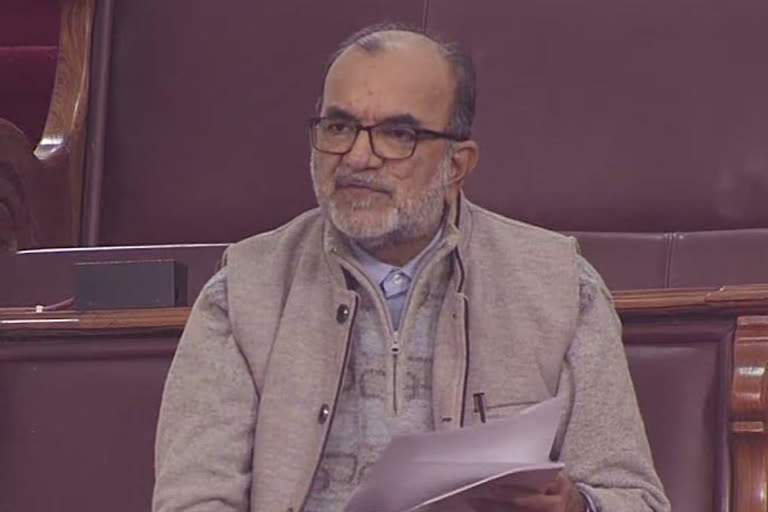New Delhi: A private member bill to regulate the appointment of judges to the High Courts, as well as the Supreme Court, was introduced on Friday in the Rajya Sabha by CPI (M) MP Bikash Ranjan Bhattacharya. The National Judicial Commission Bill, 2022, was introduced after a majority of voice votes were in its favour.
The Bill, if approved, will also regulate the transfers, lay down judicial standards and provide for accountability of judges, as well as 'establish credible and expedient mechanism' for individual complaints for misbehaviour or incapacity of a judge. It also proposes the presentation of an address by Parliament to the President in relation to proceeding for the removal of a judge and for matters connected therewith or incidental thereto.
As per submissions made in the Bill
- The National Judicial Commission Bill (NJAC) would be a body comprising the Chief Justice of India (chairperson, ex-officio), two other senior-most Supreme Court judges (ex-officio member), Law Minister(ex-officio member) and two eminent persons (to be nominated by a committee consisting of CJI, the Prime Minister and the Leader of the Opposition in the Lok Sabha) among whom at least one person would have to be nominated from SC/ST/minorities/women category.
- The body would be responsible for the appointment and transfer of judges and would replace the existing collegium system, which is led by the CJI and comprises four senior-most judges of the Apex Court, who recommend names for elevation and transfer to the government.
- The Centre would make a reference to the NJAC as and when a vacancy arises. In case of a vacancy arising out of the completion of the term, a reference would be made to NJAC six months in advance, and in case of vacancies due to death or resignation, a reference would be made within 30 days of its occurrence. The NJAC would appoint the senior-most judge of SC as the CJI, as well as other SC judges, the Chief Justice of High Courts and HC judges. It shall also make recommendations for the transfer of judges.
- If two NJAC members do not agree to a recommendation, the person will not be appointed.
- President can ask the NJAC to reconsider the recommendation and in case of a unanimous decision by the NJAC President have to appoint the person concerned.
Before this, the last time the Bill was introduced was back on August 11, 2014, by the then Law Minister Ravi Shankar Prasad, following which it was passed in the Lok Sabha on August 13 and in the Rajya Sabha on August 14. However, it was challenged in the Supreme Court and was subsequently struck down by a five-judge Constitution bench on October 16, 2015, with a 4:1 majority.
Also read: SC rejects plea seeking copies of 2018 Collegium agenda, decisions, resolution
The bench, at the time, comprised Justices Madan Lokur, JS Khehar, Adarsh Kumar Goel, Jurian Joseph and Jasti Chelameswar. Justice Chelameswar was the sole dissenter on the bench, and went against the majority opinion, and the subsequent ruling, that NJAC was 'unconstitutional' and that it violated the "basic structure of the Constitution".
The court had stated that the judiciary can not risk being indebted towards the 'political-executive' and had held that involvement of the executive in the appointment of judges would violate the principle of separation of powers between executive and judiciary, which forms the basic structure of the Constitution of India.
However, it also admitted that there were issues within the Collegium system of appointing judges. "Help us improve and better the system. You see the mind is a wonderful instrument. The variance of opinions when different minds and interests meet or collide is wonderful," it added.
Justice Chelameswar, meanwhile, had opined that transparency was crucial in a constitutional structure of governance, terming the appointment process by the Collegium as 'opaque' and that the total removal of the executive violated the Constitution's basic feature of checks and balances. Meanwhile, on Friday, the Bill was opposed by Aam Aadmi Party MP Raghav Chadha, who stated that the matter had previously also come to be considered by the top court thrice in the past.
Also read: SC expresses displeasure over Centre giving excuses to delay clearing appointments of judges
"All three times, while giving importance to the independence of the judiciary, the Supreme Court dismissed the framework of the NJAC. I have stood to oppose the NJAC, which my honourable colleague has introduced," Chadha said. The recent presentation of the Bill comes after the Vice-President, Jagdeep Dhankar, last week targeted the Supreme Court for its striking down of NJAC. The Vice-President had termed it a 'severe compromise' of parliamentary sovereignty and disregard of the 'will of the people'.
This was followed by the Supreme Court criticising said comments later on, while it heard a case related to the government allegedly sitting over names recommended by the Collegium for the appointment of judges. Taking into account Dhankar's comments, the SC condemned the statement and directed the Attorney General to convey its disappointment to the government over the remarks in question.



